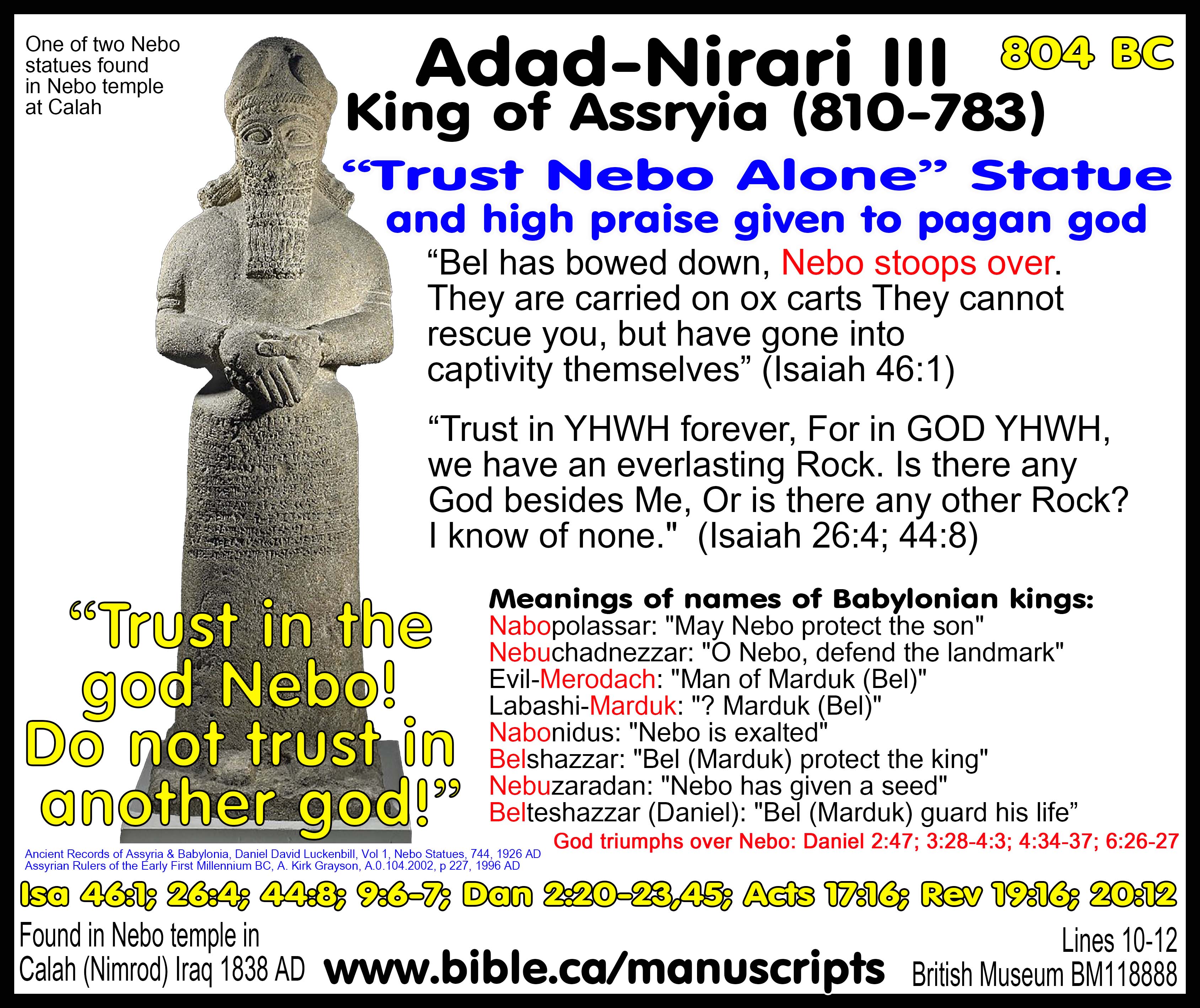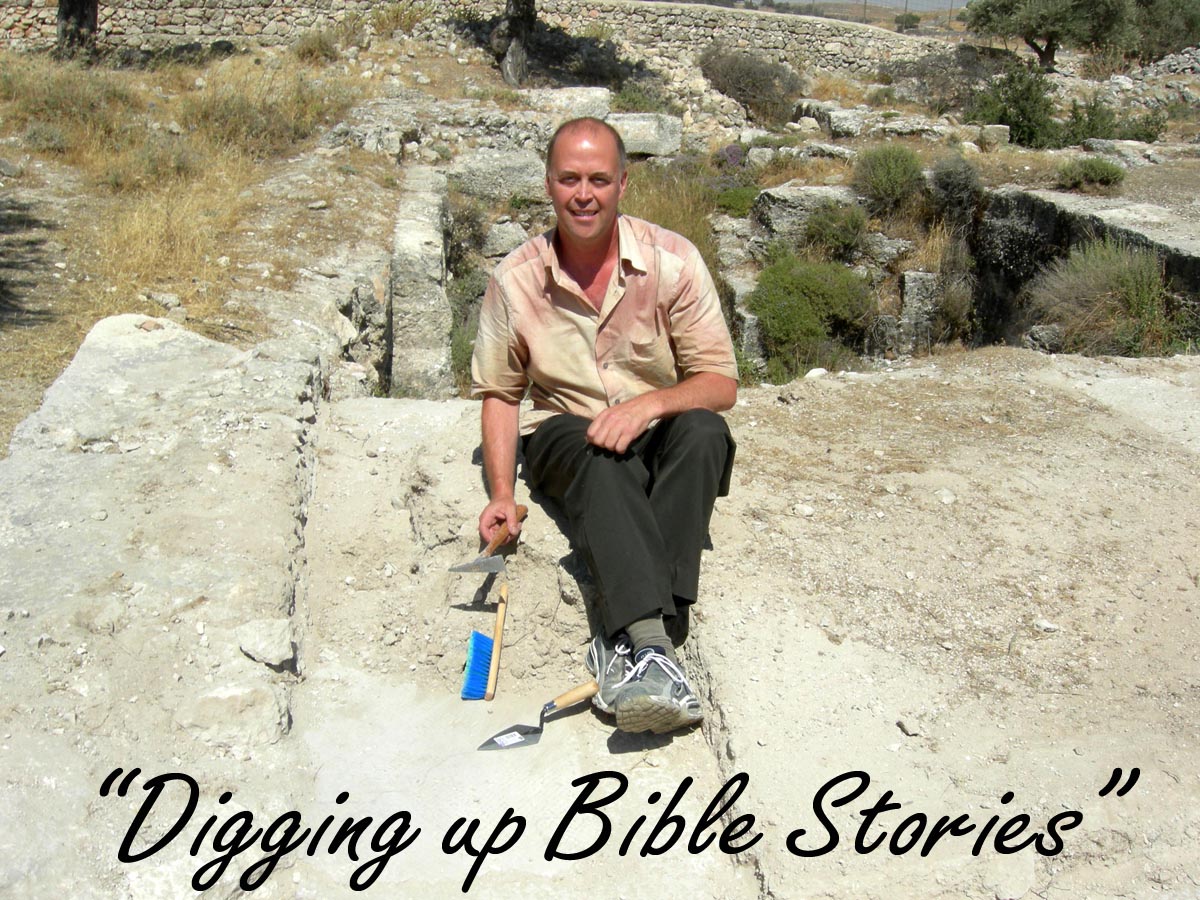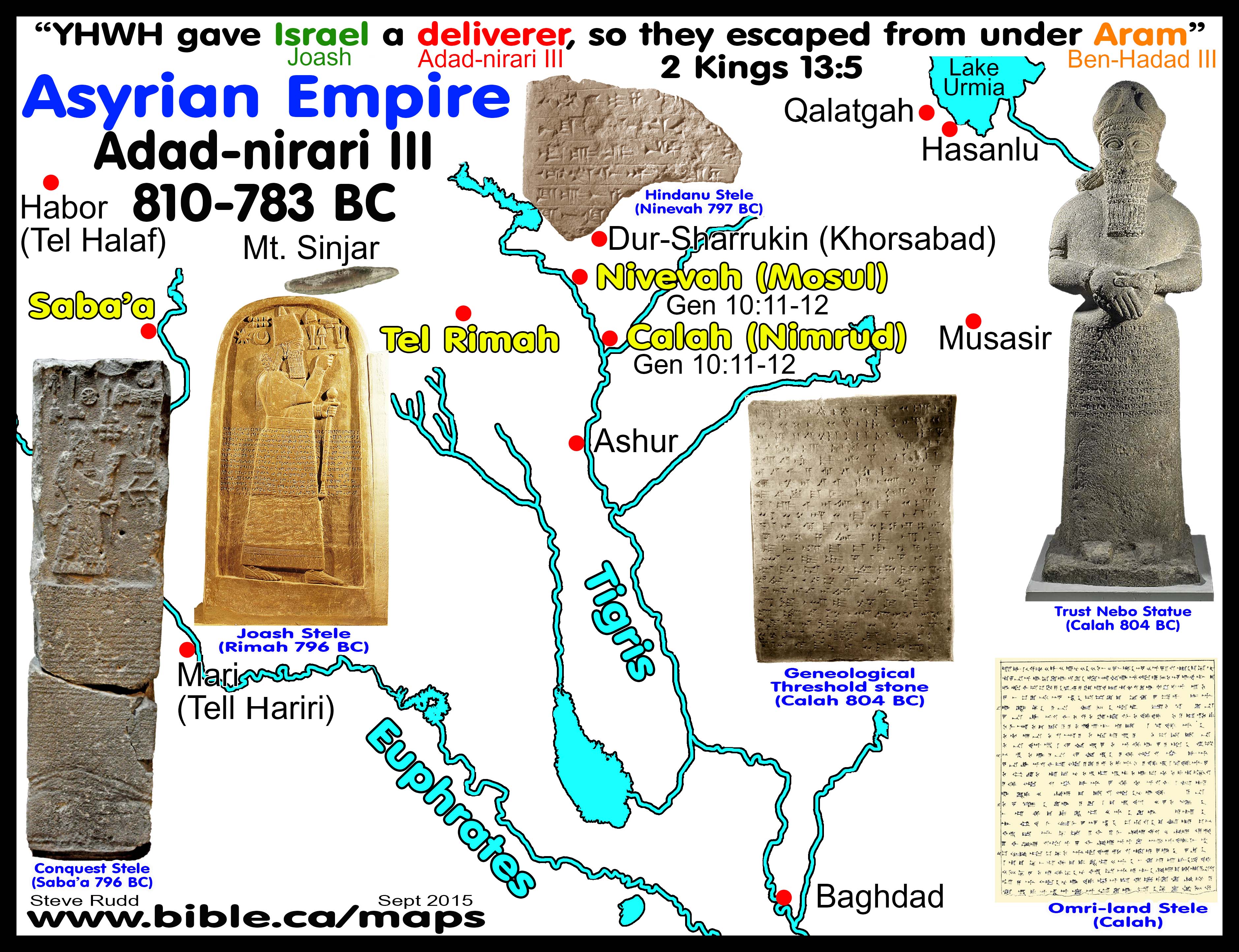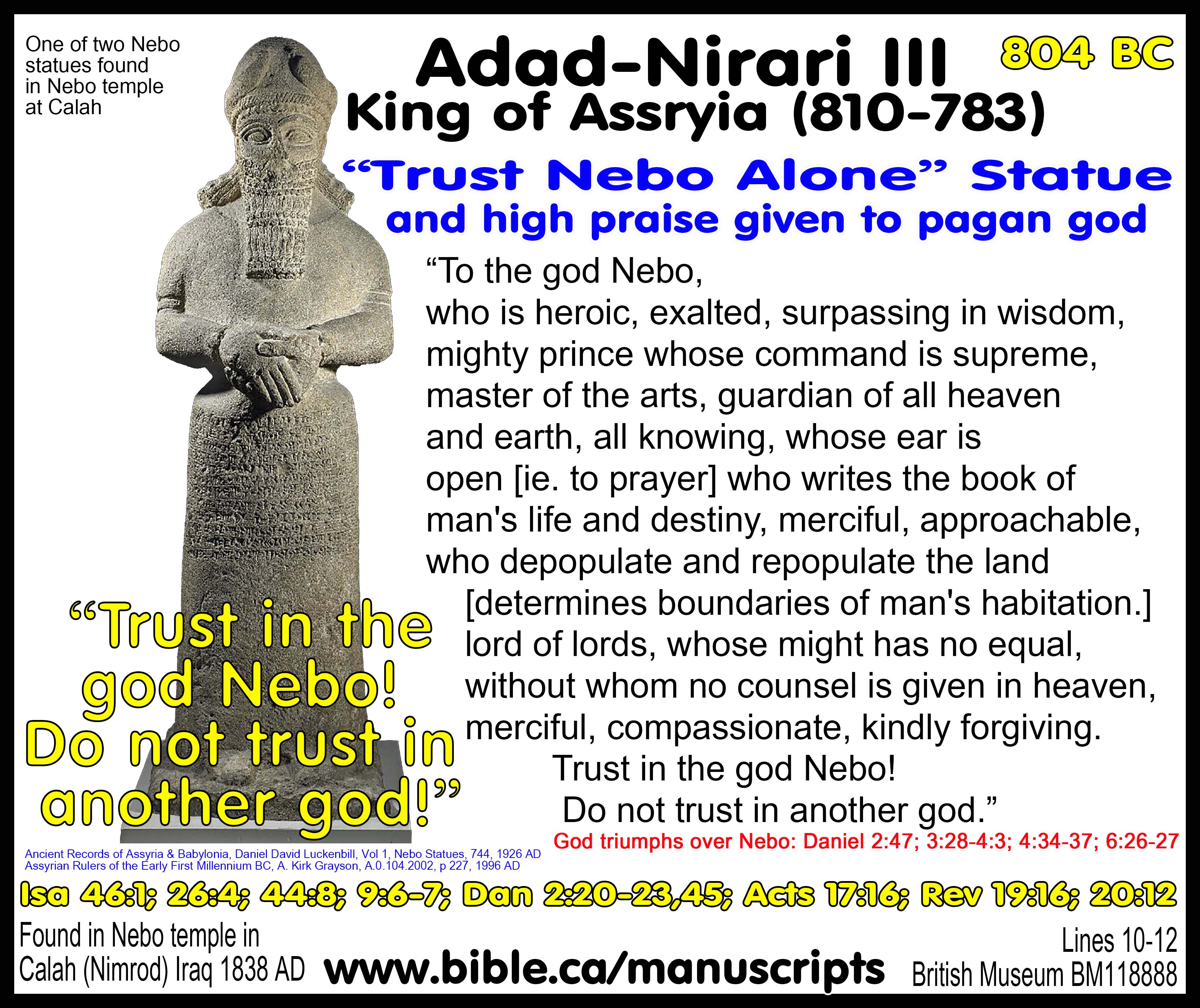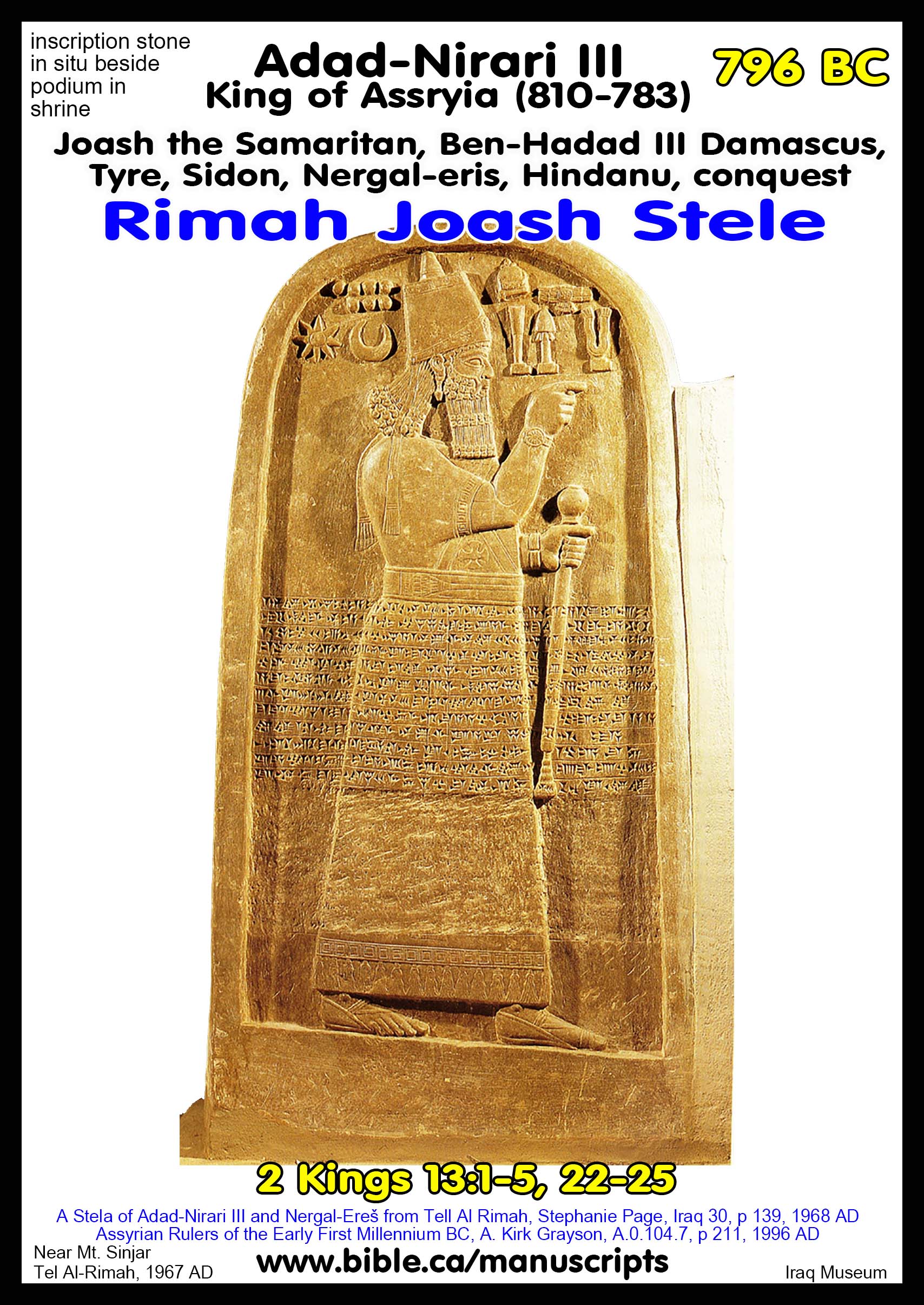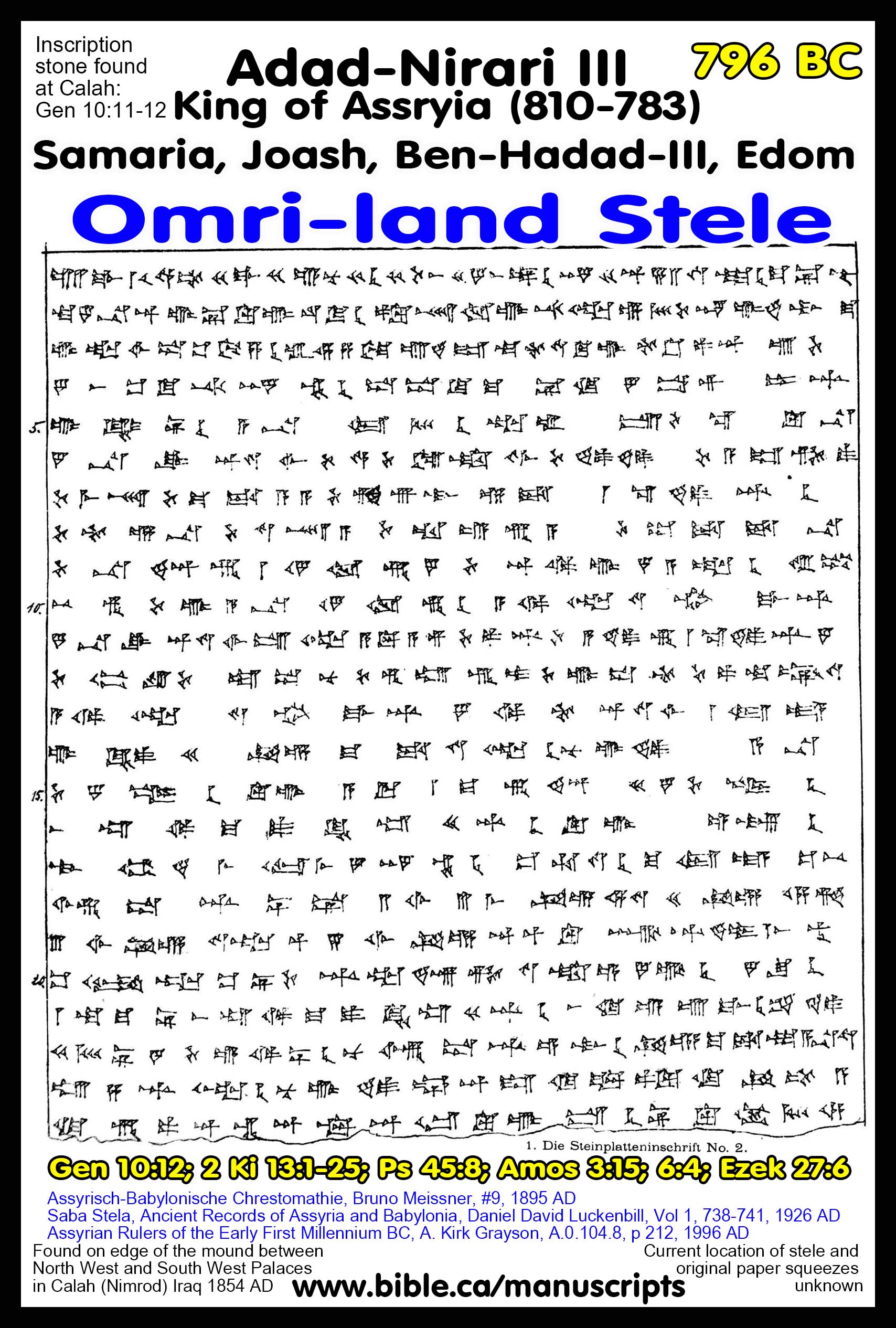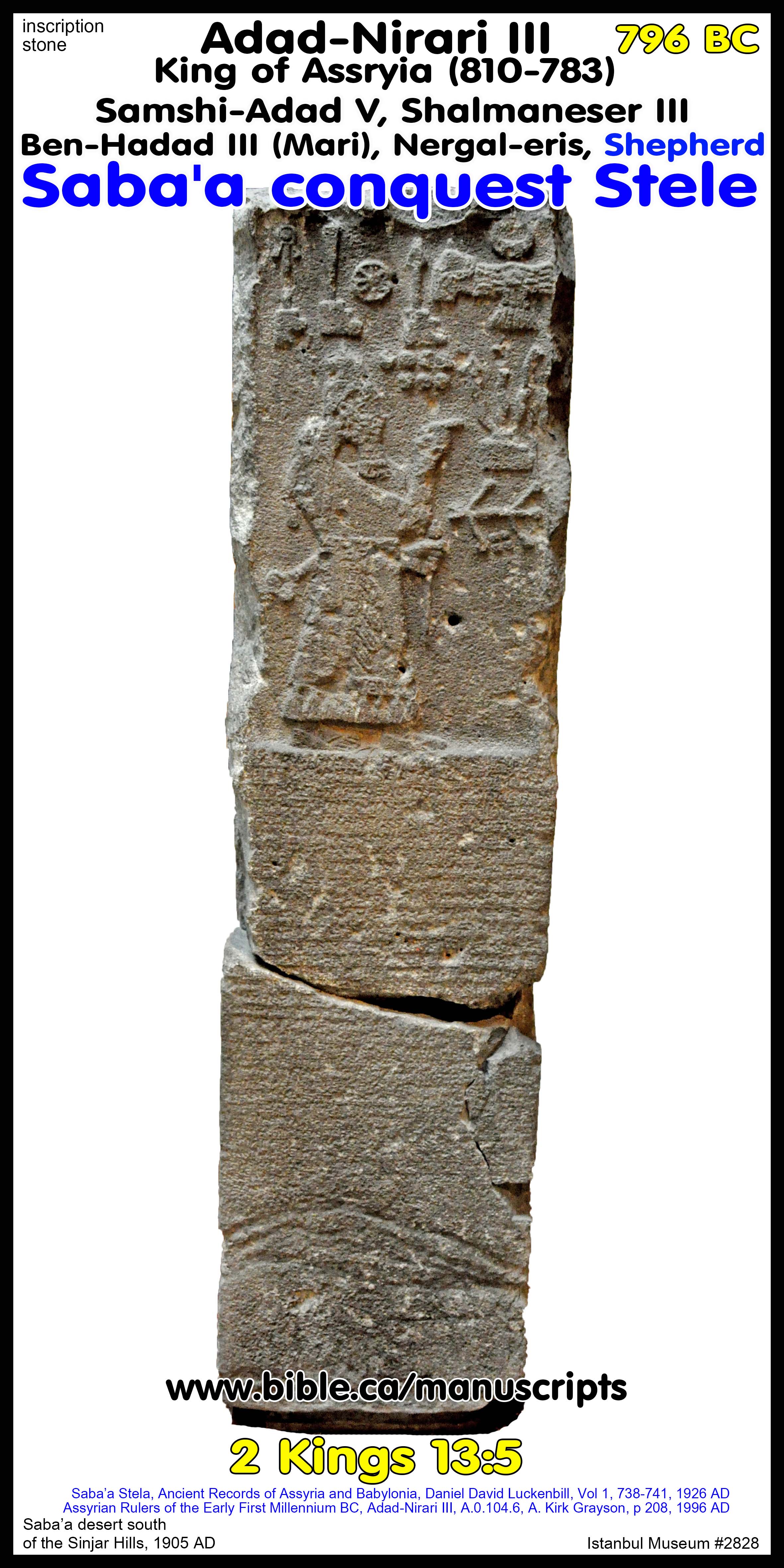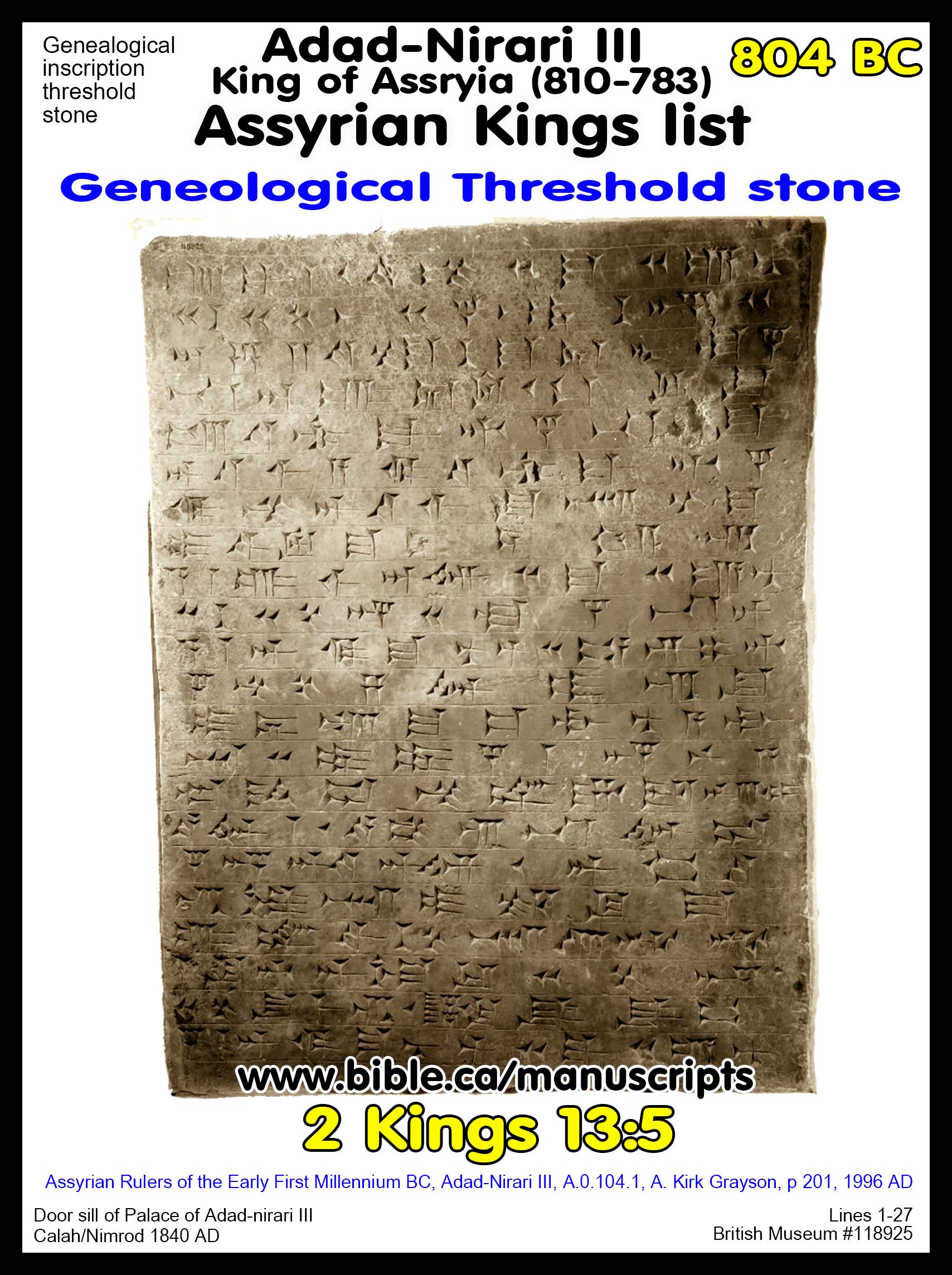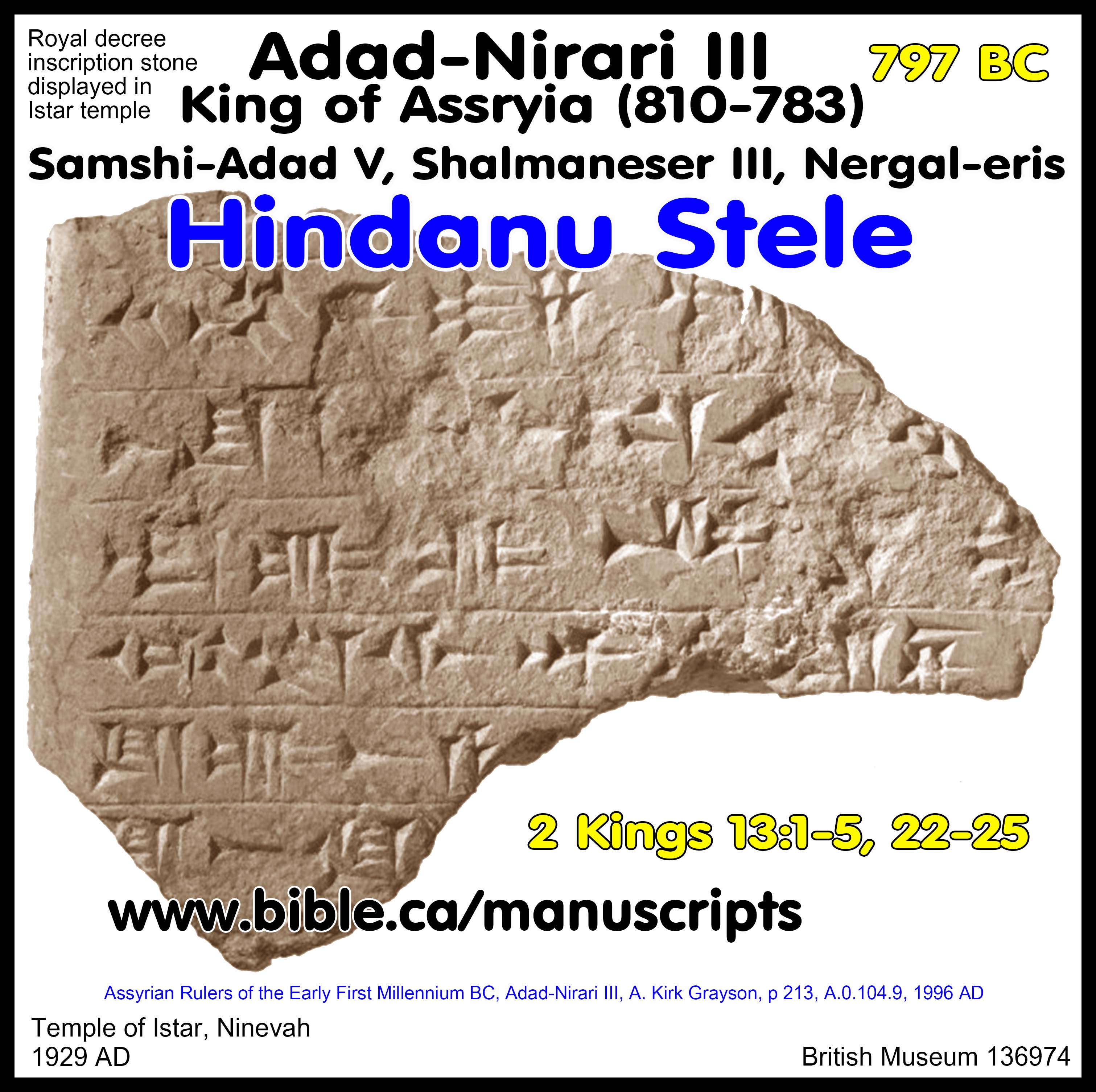Adad-Nirari III, King of Assyria (810-783)
"Trust Nebo Alone" and praise statue of 804 BC
Babylon directly adopted Bel and Nebo as their gods. Nebuchadnezzar was named after Nebo, and would have been familiar with the praise men were giving Nebo 200 years earlier. Daniel applies the identical praise found on this Nebo statue, to YHWH in Dan 2:20-23. This would not have gone unnoticed by Nebuchadnezzar who would later voice the same words himself of praise to YHWH!
|
Adad-Nirari III (810 - 783 BC) "The unknown deliverer" |
||
|
2 Kings 13:5 |
||
|
"YHWH gave Israel King Jehoahaz & Joash (Israel) |
a deliverer King Adad-nirari III (Assyria) |
they escaped Aram" King Ben Hadad III (Aram) |
While native Hebrews were "Committing adultery with stones and trees" God gets high praise and worship out of the mouth of pagan kings of Babylon.
One of two statues found in the temple of Nebo in Calah (Nimrod)
|
Temple Statue of Nebo of Adad-nirari III: 804 BC "To the god Nebo who is heroic, exalted, surpassing in wisdom, mighty prince whose command is supreme, master of the arts, guardian of all heaven and earth, all knowing, whose ear is open [ie. to prayer] who writes the book of man's life and destiny, merciful, approachable, who depopulate and repopulate the land [determines the boundaries of man's habitation.] lord of lords, whose might has no equal, without whom no counsel is given in heaven, merciful, compassionate, kindly forgiving. Trust in the god Nebo! Do not trust in another god." (Trust Nebo Alone Statue of Adad-nardi III, 804 BC)
|
|
Digging up Bible stories! Babylon directly adopted Bel and Nebo as their gods. Nebuchadnezzar was named after Nebo, and would have been familiar with the praise men were giving Nebo 200 years earlier. Daniel applies the identical praise found on this Nebo statue, to YHWH in Dan 2:20-23. This would not have gone unnoticed by Nebuchadnezzar who would later voice the same words himself of praise to YHWH!
Detailed outline on Adad-Nirari III "What we read in the book, we find in the ground" |
Introduction:
- The two inscribed statues of idol god Nebo were commissioned around 804 BC by Adad-Nirari III, (King of Assyria: 810-783) to be set up in the temple of Nebo in Nimrud, the ancient city of Calah mentioned in Genesis 10:11-12.
- There were actually a total of four statues of Nebo, but only two were inscribed with poem of praise to Nebo.
- Calah (Genesis 10:11-12) is one of four major cities founded by Nimrod (Nimrud).
- This PRAISE inscription on the statues of Nebo, is SHOCKINGLY SIMILAR to how the Bible describes the one true God, YHWH and Jesus Christ.
- Nebuchadnezzar was named after Nebo, and would have been familiar with the praise men were giving Nebo.
- Daniel applies this same identical praise found on this Nebo statue, to YHWH in Dan 2:20-23.
- Idol worship of stones and trees is "stupid, foolish, delusional"
- Israel committed adultery with stones and trees
- God divorced Israel (10 lost tribes) for adultery and sent her away into Assyrian captivity in 723 BC.
- While native Hebrews were "Committing adultery with stones and trees" God gets high praise and worship out of the mouth of pagan kings of Babylon.
- Bel and Nebo were two of the many gods both Judah and Israel worshipped.
- Bel was the father of Nebo
- Isa 46:1 mocks the fact that every year Bel and Nebo were transported on ox carts in the new year processional.
- “Bel has bowed down, Nebo stoops over. They are carried on ox carts They cannot rescue you, but have gone into captivity themselves” (Isaiah 46:1)
- Nebo was the keeper of the "book of life" and recorded the good and bad deeds of man in books.
- This is almost identical to the reality we know from Revelation:
- "And I saw the dead, great and small, standing before the throne, and books were opened. Also another book was opened, the book of life. And the dead were judged according to their works, as recorded in the books." (Revelation 20:12)
- The prophet Daniel and the Babylonian kings were all named after Bel and Nebo:
- Belteshazzar (Daniel): "Bel (Marduk) guard his life”.
- Nebuchadnezzar: "O Nebo, defend the landmark"
|
Babylonian Kings |
Reign BC |
Relation |
Meaning and definition of Babylonian name |
|
Nabopolassar |
626- 605 |
Father |
Nabopolassar: "May Nebo protect the son" |
|
Nebuchadnezzar |
605-562 |
Son of Nabopolassar |
Nebuchadnezzar: "O Nebo, defend the landmark" |
|
Evil-Merodach |
562-560 |
Son Nebuchadnezzar |
Evil-Merodach: "Man of Marduk (Bel)" |
|
Nergal-Sharezer |
560-556 |
Nebuchadnezzar’s son-in-law; Evil-Merodach’s brother in law |
Nergal-Sharezer: O Nergal, defend the king |
|
Labashi-Marduk |
556 |
Son of Nergal-Sharezer |
Labashi-Marduk: "? Marduk (Bel)" |
|
Nabonidus |
556-539 |
Assumed to be related by marriage to Nebuchadnezzar through mother or grandmother. |
Nabonidus: "Nebo is exalted" |
|
Belshazzar
|
553-539 |
Son of Nabonidus Second under Nabonidus his father: Daniel offered 3rd place: Dan 5:29) |
Belshazzar: "Bel (Marduk) protect the king" |
|
Nebuzaradan |
605-586 |
Nebuchadnezzar's army general in Jerusalem in 587 BC. |
Nebuzaradan: "Nebo has given a seed" |
|
Belteshazzar (Daniel) |
605-536 |
Prophet in Babylon, Persia |
Belteshazzar (Daniel): "Bel (Marduk) guard his life” |
I. About the four statues of Nebo found in the temple of Nebo from Calah/Nimrod:
- This is catalogued by Grayson as A.0.104.2002.
- "Two statues of the god Nabu [Nebo] were set up at Nimrud by Bel-tarsi-iluma, governor of Calah, "for the life of Adad-nirari, king of Assyria, his lord, and Sammuramat, the queen (palace woman), his lady" and for his own life. These are Nos. 69 and 70 of the Nimrud Central Saloon in the British Museum (text published in IR, Plate 35, No. 2)." (Ancient Records of Assyria & Babylonia, Daniel David Luckenbill, Vol 1, The Inscription on the Nebo Statues, 744, 1926 AD)
- "This text, dedicated to the god Nabu, is inscribed on two human-shaped statues (160 cm in height) of stone found in the Nabu temple at Calah. Two other similar statues, but uninscribed, were found with them. The dedication is made by Bel-tarsi-ilumma, governor of Calah, and it is to be presumed that the statues represent him and were erected in the Nabu temple to show him worshipping that god (see the introduction above). According to the text, he dedicated the statues to the life of the king, Adad-narari III, and the king's mother, Semiramis." (Assyrian Rulers of the Early First Millennium BC, Adad-Nirari III, Trust Nebo Alone Statue, A.0.104.2002, A. Kirk Grayson, p 226, 1996 AD)
- "The inscriptions on the two statues are identical, with two minor variants, and therefore no scores are given. BM 118888 has in line 4 "su-ka-mi" and in line 6 it omits "ina". In line 5 I have followed the interpretation of CAD 11/1(N) p. 97 and von Soden. AHw p. 708b, rather than that of Goetze, JCS 19 (1965) 129. The two uninscribed statues were left at the site, while the two inscribed objects were removed to the British Museum, where they are registered as BM 118888 and 118889 (56-9-9,64 and 65). The inscriptions have been collated. (Assyrian Rulers of the Early First Millennium BC, Adad-Nirari III, Trust Nebo Alone Statue, A.0.104.2002, A. Kirk Grayson, p 226, 1996 AD)
II. Translation of "Trust Nebo alone" Stone statue of Adad-Nirari III:
- (lines 1-8a) To the god Naba, heroic (and) exalted, son of Esagil, wise (and) splendid, mighty prince, heir of the god Nudimmud, whose command is supreme, skilled in the arts, trustee of all heaven and underworld, expert in everything, wise, the one who can write (lit. "holder of the tablet stylus"), learned in the scribal art, merciful (and) judicious, (line 5) who has the power to depopulate (and) repopulate (a country), beloved of the god Enlil, lord of lords, whose might has no rival, without whom there can be no order in heaven, the merciful (and) compassionate whose benevolence is good, dweller in Ezida, which is within Calah, the great lord, his lord: (lines 8b-9a) For the life of Adad-narari, king of Assyria, his lord, and (for) the life of Semiramis, the palace woman, his mistress: (lines 9b-12a) Has Bel-tarsi-ilumma, governor of Calah (and) the lands liamedu, Sirgana, Temenu, (and) Ialuna, had (this statue) made and he dedicated (it) for his life, that his days might be long, his years many, (for) the well-being of his family (lit. "house") and people, (and) that he might not become ill. (line 12b) Whoever you are, after (me), trust in the god Nabil! Do not trust in another god! (Assyrian Rulers of the Early First Millennium BC, Adad-Nirari III, Trust Nebo Alone Statue, A.0.104.2002, A. Kirk Grayson, p 227, 1996 AD)
- "To Nabu [Nebo], the powerful, the exalted child of Esagila, surpassing in wisdom, the powerful prince, son of Nudimmut, whose word takes precedence, master of the arts, guardian of all heaven and earth, all knowing, whose mind is open (lit., of wide ear, [ie. hears prayers]), who holds the writing-reed, who possesses a clasping hand(?), the merciful, the approachable(?), from whom come (lit., are) the beautification (enlightenment) (and) founding (of human habitations); the beloved of Enlil, lord of lords, whose might has no equal, without whom no counsel is given in heaven; the merciful, the compassionate, whose forgiveness is kindly, who dwells in Ezida which is in Calah; the great lord, his lord, for the life of Adad-nirari, king of Assyria, his lord, and for the life of Sammuramat (Semiramis) the royal lady (lit., palace woman), his lady (I), Bel-tarsi-iluma, governor of Calah, Hamedi, Sirgana, Temeni, Ialuna, for his own life (lit., life of his soul), length of days, many years, the peace of his house and his people, for deliverance from sickness, have made and presented (this statue). O man, who shall come after (me), on Nabu wait. Do not trust in another god. (Ancient Records of Assyria & Babylonia, Daniel David Luckenbill, Vol 1, The Inscription on the Nebo Statues, 745, 1926 AD)
III. SHOCKINGLY SIMILAR PRAISE given to Nebo made God jealous!
- "To the god Nebo who is heroic, exalted, surpassing in wisdom, mighty prince whose command is supreme, master of the arts, guardian of all heaven and earth, all knowing, whose ear is open [ie. to prayer] who writes the book of man' life and destiny, merciful, approachable, who depopulate and repopulate the land [determines the boundaries of man's habitation. Acts 17:26] lord of lords, whose might has no equal, without whom no counsel is given in heaven, merciful, compassionate, kindly forgiving. Trust in the god Nebo! Do not trust in another god." (Trust Nebo Alone Statue of Adad-nardi III, 804 BC)
- No wonder God was jealous!
- The praise they gave Nebo was identical to that we should give the one true God YHWH: Father and Son (Jesus) and Holy Spirit.
- With this kind of divine praise offer a chunk of carved rock, it is little wonder the true living God was both jealous and angry.
- God openly mocks that Bel and Nebo were just stones that needed to be moved around with dumb oxen:
- "Bel bows down, Nebo stoops, their idols are on beasts and cattle; these things you carry are loaded as burdens on weary animals." (Isaiah 46:1)
- God contrasted the dumb stone idol of Bel with the EVERLASTING ROCK: YHWH- Jesus Christ
- A great contrast between man's idol stone cut out of a mountain and God's rock cut out of a mountain without hands (Jesus Christ) that will destroy all idols.
- "Trust in the Lord forever, for in the Lord God you have an everlasting rock." (Isaiah 26:4)
- "Do not fear, or be afraid; have I not told you from of old and declared it? You are my witnesses! Is there any god besides me? There is no other rock; I know not one." (Isaiah 44:8)
- Jesus Christ is the rock who came and crushed the statue of Daniel's vision in Dan 2:45
- "Inasmuch as you saw that a stone was cut out of the mountain without hands and that it crushed the iron, the bronze, the clay, the silver and the gold, the great God has made known to the king what will take place in the future; so the dream is true and its interpretation is trustworthy.”" (Daniel 2:45)
- The praise of Nebo, the stone, was supposed to given to the one true God: YHWH:
- "For a child has been born for us, a son given to us; authority rests upon his shoulders; and he is named Wonderful Counselor, Mighty God, Everlasting Father, Prince of Peace. His authority shall grow continually, and there shall be endless peace for the throne of David and his kingdom. He will establish and uphold it with justice and with righteousness from this time onward and forevermore. The zeal of the Lord of hosts will do this." (Isaiah 9:6–7)
- "From one ancestor he made all nations to inhabit the whole earth, and he allotted the times of their existence and the boundaries of the places where they would live" (Acts 17:26)
- "On his robe and on his thigh he has a name inscribed, “King of kings and Lord of lords.”" (Revelation 19:16)
- "And I saw the dead, great and small, standing before the throne, and books were opened. Also another book was opened, the book of life. And the dead were judged according to their works, as recorded in the books." (Revelation 20:12)
- The entire point of the vision of Dan 2 was to show that YHWH clearly controlled where man dwelled and who was king in direct contrast to Nebuchadnezzar's stone god Nebo.
- Nebuchadnezzar was named after Nebo, and would have been familiar with the praise men were giving Nebo. Daniel applies this same identical praise to YHWH in Dan 2:20-23.
- YWHW vs. Nebo: "This was the dream; now we will tell its interpretation before the king. "Daniel said, “Let the name of God be blessed forever and ever, For wisdom and power belong to Him. “It is He who changes the times and the epochs; He removes kings and establishes kings; He gives wisdom to wise men And knowledge to men of understanding. “It is He who reveals the profound and hidden things; He knows what is in the darkness, And the light dwells with Him. “To You, O God of my fathers, I give thanks and praise, For You have given me wisdom and power; Even now You have made known to me what we requested of You, For You have made known to us the king’s matter.”" (Daniel 2:20-23)
- The invocation to TRUST NEBO ALONE is echoed in several passages in Isaiah:
- “Trust in YHWH forever, For in GOD YHWH, we have an everlasting Rock. Is there any God besides Me, Or is there any other Rock? I know of none." (Isaiah 26:4; 44:8)
IV. Daniel and the Babylonian kings were named after Bel and Nebo:
- "Nebo comes from the same root as the Hebrew word for prophet. His non-Hebrew name was Nabu. He was considered to be the god of learning and a major god in the Assyro-Babylonian pantheon. He was patron of the art of writing and a god of vegetation. Nebo’s symbols were the clay tablet and the stylus, the instruments deemed proper to him who inscribed the fates assigned to men by the gods." (The New Manners and Customs of the Bible, Isa 46:1, 1998 AD)
- Notice Bel (Marduk) and Nebo in the names of Babylonian rulers and kings and the Meanings of names of Babylonian kings:
- Belteshazzar (Daniel): "Bel (Marduk) guard his life”, Bel-te-shazzar, is a corrupt spelling of Belshazzar
- Shadrach (Hananiah): "Shadrach" is a corruption of "sudur-aku", the moon god, meaning COMMAND OF AKU.
- Abednego (Azariah): "servant of Nebo" Nego is an alternate corrupt spelling of Nebo/Nabu”
- Michach (Mishael): “Who is what God is?” (Meshach has all the appearance of a further disfigurement of a Babylonian original no longer recognizable.)
- Nabopolassar: "May Nebo protect the son"
- Nebuchadnezzar: "O Nebo, defend the landmark"
- Evil-Merodach: "Man of Marduk (Bel)"
- Labashi-Marduk: "? Marduk (Bel)"
- Nabonidus: "Nebo is exalted"
- Belshazzar: "Bel (Marduk) protect the king"
- Nebuzaradan: "Nebo has given a seed"
- It is quite interesting that Daniel, the holiest and most important prophet of YHWH during the 70 year Babylonian Captivity would refuse to eat non-kosher food but allow himself to be named after the pagan god Bel: Belteshazzar (Daniel): "Bel (Marduk) guard his life”. Yet Bel-te-shazzar is almost certainly an intentional corruption of the Babylonian Belshazzar, the same name as the last king of Babylon.
- It is clear that the names of Shadrach and Abednego are corruptions of the names of the idol gods Bel and Nebo.
- "Marduk" (Bel) alternate corrupt spelling for Marduk
- "Nego" is an alternate corrupt spelling of Nebo
- Perhaps they protested being called after these pagan gods of stone and the king allowed them to change the spelling JUST A LITTLE to keep them happy and overcome their protests.
- "But finally Daniel came in before me [Nebuchadnezzar], whose name is Belteshazzar according to the name of my [Nebuchadnezzar] god, and in whom is a spirit of the holy gods; and I related the dream to him [Daniel], saying, ‘O Belteshazzar, chief of the magicians, since I know that a spirit of the holy gods is in you and no mystery baffles you, tell me the visions of my dream which I have seen, along with its interpretation." (Daniel 4:8–9)
- Daniel's name Bel-te-shazzar, is a corrupt spelling of Belshazzar, which, although retains the BEL, likely sounded different with the BELTE of the pagan god Bel.
- "A rose by any other name, still smells the same".
V. About idol pagan gods Nebo and Bel:
- Bel was also called Markuk who was the father of Nebo.
- "NEBO (Deity) Marduk’s son and a chief god among the Babylonian pantheon. Nebo (Hebrew spelling; pronounced Nabu in Akkadian) was the patron deity of wisdom, education, and literature. Originally the local city god of Borsippa, Nebo grew in prominence with the rise of the Babylonian Empire. Numerous inscriptions affirm his popularity among the Babylonian and Assyrian kings. At Kalkhi (modern Nimrud), an ancient capital of Assyria, a temple was built and maintained for Nebo and his consort Tashmit. Isaiah ridiculed Nebo for his inability to save even himself from being carried into captivity (Is 46:1)." (Tyndale Bible Dictionary, Nebo, 2001 AD)
- "The popularity of Nebo can be seen in the combination of his name with the names of ancient kings: for example, Nebuchadnezzar, Nebuzaradan, Nebuhashban, Nabonedus, Nabonassar, Naburianus, Nabonabus, Nabopolassar. Several statues of Nebo were found at Nimrud, an ancient city of Assyria south of present-day Mosul, Iraq: (The New Manners and Customs of the Bible, Isa 46:1, 1998 AD)
- Isa 46:1 Records how Both Bel and Nebo were carried on ox carts an annual processional every new years.
- "NEBO [nēˊbō] (Heb. neḇô; Akk. Nabű “to call, announce”) (DEITY). Hebrew form of Nabű, a prominent Babylonian deity, the son of Marduk. Associated with the planet Mercury, he was the god of writing, and by extension of wisdom, trade and commerce, and prophetic omens. His major temple was Ezida, located in Borsippa. Nebo and Bel (another name for Marduk) were carried in procession together as a major part of the New Year’s (Akītu) ceremony in Babylon. Isa. 46:1 refers to such a procession, remarking that the idols of these gods could not even determine which direction they themselves were carried, but had to be carried by dumb animals. Nebo may have been one of the Babylonian gods worshipped by the Israelites. (Eerdmans Bible Dictionary, Nebo, 1987 AD)
- Nebo was a scribe who wrote the book of human deeds and the book life:
- "Nebo (Heb. nĕḇô; Akk. nabű) (DEITY) One of two principal gods of the Babylonian pantheon. The name is found as early as the early 2nd millennium b.c., but Nebo worship began its ascendancy ca. 925 and was at its peak in Babylon by the 7th century, roughly the time of Isaiah. As son of Marduk, Nebo was considered to be the keeper of the tablets of the gods, and thus a scribe. As such he had access to secrets that others who could not read did not, granting him wisdom, and so he could control religious rites. He wrote down the decisions of the gods and kept accounts of human dealings, especially on his “tablet of life” and “tablet of destiny” (cf. Exod. 32:32–33; Ps. 69:28 [MT 29]; Rev. 20:12, 15). Isa. 46:1 depicts Nebo, with Bel, being carried in the New Year procession, unable to help his people (in contrast to the God of Israel). (Eerdmans dictionary of the Bible, Nebo, 2000 AD)
- "But now, if you will only forgive their sin—but if not, blot me out of the book that you have written.” But the Lord said to Moses, “Whoever has sinned against me I will blot out of my book." (Exodus 32:32–33)
- "Let them be blotted out of the book of the living; let them not be enrolled among the righteous." (Psalm 69:28)
- "And I saw the dead, great and small, standing before the throne, and books were opened. Also another book was opened, the book of life. And the dead were judged according to their works, as recorded in the books." (Revelation 20:12)
- "and anyone whose name was not found written in the book of life was thrown into the lake of fire." (Revelation 20:15)
VI. About the pagan idol god Hadad (Adad): Adad-nirari III (Assyria), Ben-Hadad III (Aram) were both named after HADAD!
- It is amazing that both Adad-nirari III (king of Assyria) and Ben-Hadad III (king of Aram at Damascus) were named after the SAME PAGAN GOD: HADAD
- Adad and Hadad are two different spellings of the same "storm god"
- Adad-nirari III is literally “Adad is my helper"
- Ben-Hadad is literally "son of Hadad"
- We find the same thing true with all the Babylonian kings being named after idol gods Bel or Nebo. (Nebuchadnezzar)
- "Adad (Addu, Akkadian), Hadda/i/u (West Semetic), storm-god. may also stand for Baal" (The Amarna Letters, W. L. Moran, p 386, 1992 AD)
- "Hadad is the name under which the ancient Near Eastern storm god was known among various groups in the Mesopotamian and Syrian world. The god is also mentioned in a number of biblical texts and names. In this article, the biblical material will be dealt with in conjunction with the epigraphic data from the Near East. Hadad makes his first appearance as Adad in Old Akkadian texts, and in this guise he is important in the Mesopotamian world through the neo-Assyrian and neo-Babylonian periods. Hadad in all likelihood means ‘thunderer’ and as the storm-god he brings both fertility through abundant rains and destruction through fierce winds and storms. His voice (rigmu) can be a sign of both blessing and curse." (Dictionary of Deities and Demons in the Bible, Hadad, 1999 AD)
VII. Israel committed adultery with stones and trees: "stupid, foolish, delusional"
- Worshipping idols is describes as:
- gods of stones and trees
- dressed up like little Barbie dolls in fashion jewelry and clothing
- nailed to the floor so they won’t fall over.
- cannot move, speak, hear, save, do good or bad or ANYTHING
- stupid and foolish to worship
- teaching of delusion
- God gave Israel a bill of divorcement and will do the same with Judah
- Passages about idolatry being stupid, foolish and delusional:
- "And I saw that for all the adulteries of faithless Israel, I had sent her away and given her a writ of divorce, yet her treacherous sister Judah did not fear; but she went and was a harlot also. “Because of the lightness of her harlotry, she polluted the land and committed adultery with stones and trees." (Jeremiah 3:8–9)
- "Who say to a tree, ‘You are my father,’ And to a stone, ‘You gave me birth.’ For they have turned their back to Me, And not their face; But in the time of their trouble they will say, ‘Arise and save us.’ “But where are your gods Which you made for yourself? Let them arise, if they can save you In the time of your trouble; For according to the number of your cities Are your gods, O Judah." (Jeremiah 2:27-28)
- “Among the smooth stones of the ravine Is your portion, they are your lot; Even to them you have poured out a drink offering, You have made a grain offering. Shall I relent concerning these things?" (Isaiah 57:6)
- “the customs of the peoples are delusion; Because it is wood cut from the forest, The work of the hands of a craftsman with a cutting tool. “They decorate it with silver and with gold; They fasten it with nails and with hammers So that it will not totter. “Like a scarecrow in a cucumber field are they, And they cannot speak; They must be carried, Because they cannot walk! Do not fear them, For they can do no harm, Nor can they do any good.” There is none like You, O Lord; You are great, and great is Your name in might. Who would not fear You, O King of the nations? Indeed it is Your due! For among all the wise men of the nations And in all their kingdoms, There is none like You. But they are altogether stupid and foolish In their discipline of delusion—their idol is wood! Beaten silver is brought from Tarshish, And gold from Uphaz, The work of a craftsman and of the hands of a goldsmith; Violet and purple are their clothing; They are all the work of skilled men. But the Lord is the true God; He is the living God and the everlasting King. At His wrath the earth quakes, And the nations cannot endure His indignation." (Jeremiah 10:1–10)
- "They (Belshazzar) drank the wine and praised the gods of gold and silver, of bronze, iron, wood and stone." (Daniel 5:4)
VIII. Conversion accounts of Babylonian kings:
- Just as the book of Acts records the conversion accounts of Christians to Jesus Christ, so too the book of Daniel shows the conversion of Babylonian and Persian kings to the one true God YHWH.
- Nebuchadnezzar was the first king of Babylon who had contact with Daniel in 605 BC and Belshazzar was the last in 539 BC.
- Darius the Mede ruled as coregent with Cyrus from 539 - 526 BC. During this time Darius praises the God of Daniel after being thrown into the lion's den.
- God converted the Babylonian Kings from Bel and Nebo to Himself.
- Remember, each Babylonian king had the name of Bel or Nebo in their own names! "Nebuchadnezzar" "Belshazzar"
- Five times it the book of Daniel, God showed his superiority over the stone gods Bel and Nebo to the Babylonian kings.
- Each time the Babylonian king transfers the identical praise he HAD BEEN GIVING TO NEBO and BEL and gives it to the one true God YHWH!
- Notice the praise the Babylonian kings gave to the one true God through the ministry of Daniel, Shadrach, Meshach, Abednego. God triumphed over Bel and Nebo as the one who determines man's destiny:
- 602 BC: Nebuchadnezzar after Statue of four kingdoms: "The king answered Daniel and said, “Surely your God is a God of gods and a Lord of kings and a revealer of mysteries, since you have been able to reveal this mystery.”" (Daniel 2:47)
- 594 BC: Nebuchadnezzar after Furnace of fire: "Nebuchadnezzar responded and said, “Blessed be the God of Shadrach, Meshach and Abed-nego, who has sent His angel and delivered His servants who put their trust in Him, violating the king’s command, and yielded up their bodies so as not to serve or worship any god except their own God. “Therefore I make a decree that any people, nation or tongue that speaks anything offensive against the God of Shadrach, Meshach and Abed-nego shall be torn limb from limb and their houses reduced to a rubbish heap, inasmuch as there is no other god who is able to deliver in this way.” Then the king caused Shadrach, Meshach and Abed-nego to prosper in the province of Babylon. Nebuchadnezzar the king to all the peoples, nations, and men of every language that live in all the earth: “May your peace abound! “It has seemed good to me to declare the signs and wonders which the Most High God has done for me. “How great are His signs And how mighty are His wonders! His kingdom is an everlasting kingdom And His dominion is from generation to generation." (Daniel 3:28–4:3)
- 573-571 BC: Nebuchadnezzar after stricken with insanity: “But at the end of that period, I, Nebuchadnezzar, raised my eyes toward heaven and my reason returned to me, and I blessed the Most High and praised and honored Him who lives forever; For His dominion is an everlasting dominion, And His kingdom endures from generation to generation. “All the inhabitants of the earth are accounted as nothing, But He does according to His will in the host of heaven And among the inhabitants of earth; And no one can ward off His hand Or say to Him, ‘What have You done?’ “At that time my reason returned to me. And my majesty and splendor were restored to me for the glory of my kingdom, and my counselors and my nobles began seeking me out; so I was reestablished in my sovereignty, and surpassing greatness was added to me. “Now I, Nebuchadnezzar, praise, exalt and honor the King of heaven, for all His works are true and His ways just, and He is able to humble those who walk in pride.”" (Daniel 4:34–37)
- 15 Tishri 539 BC: Belshazzar after Handwriting on wall: "Yet you, his [Nebuchadnezzar] son, Belshazzar, have not humbled your heart, even though you knew all this, but you have exalted yourself against the Lord of heaven; and they have brought the vessels of His house before you, and you and your nobles, your wives and your concubines have been drinking wine from them; and you have praised the gods of silver and gold, of bronze, iron, wood and stone, which do not see, hear or understand. But the God in whose hand are your life-breath and all your ways, you have not glorified." (Daniel 5:22–23)
- 12 Marcheshvan 539- Adar 538 BC: Darius After Lion's den: "I make a decree that in all the dominion of my kingdom men are to fear and tremble before the God of Daniel; For He is the living God and enduring forever, And His kingdom is one which will not be destroyed, And His dominion will be forever. “He delivers and rescues and performs signs and wonders In heaven and on earth, Who has also delivered Daniel from the power of the lions.” (Daniel 6:26–27)
Conclusion:
- Idol worship is committing spiritual adultery with stones and trees
- It is described as being "stupid, foolish, delusional"
- For this adultery, God divorced Israel and sent her away forever. (only a tiny faithful remnant survived)
- It is quite interesting that the holiest and most important prophet of YHWH during the 70 year Babylonian Captivity would refuse to eat non-kosher food but allow himself to be named after the pagan god Bel: Belteshazzar (Daniel): "Bel (Marduk) guard his life”
- This amazing inscription on the two stone statues of the pagan idol God NEBO, is shockingly similar to how the Bible describes the one true God, YHWH and Jesus Christ.
- With this kind of divine praise offer a chunk of carved rock, it is little wonder the true living God was both jealous and angry.
- "I, John, am the one who heard and saw these things. And when I heard and saw, I fell down to worship at the feet of the angel who showed me these things. But he said to me, “Do not do that. I am a fellow servant of yours and of your brethren the prophets and of those who heed the words of this book. Worship God.”" (Revelation 22:8–9)
- Worship God alone!
- Nebuchadnezzar was named after Nebo, and would have been familiar with the praise men were giving Nebo. Daniel applies this same identical praise to YHWH in Dan 2:20-23.
- A great contrast between man's idol stone cut out of a mountain and God's rock cut out of a mountain without hands that will destroy all idols.
- "Inasmuch as you saw that a stone was cut out of the mountain without hands and that it crushed the iron, the bronze, the clay, the silver and the gold, the great God has made known to the king what will take place in the future; so the dream is true and its interpretation is trustworthy." (Daniel 2:45)
- The book of Daniel lists 5 conversion stories of Babylonian and Persian kings away from Bel and Nebo.
- Daniel applies the same identical praise found on this Nebo statue, to YHWH in Dan 2:20-23.
- Just as the book of Acts records the conversion accounts of Christians to Jesus Christ, so too the book of Daniel shows the conversion of Babylonian and Persian kings to the one true God YHWH.
- While native Hebrews were "Committing adultery with stones and trees" God gets high praise and worship out of the mouth of pagan kings of Babylon.
- Pagan kings praising YHWH: God triumphs over Nebo through the mouths of Babylonian kings named after Bel and his son Nebo: Daniel 2:47; 3:28-4:3; 4:34-37; 5:22-23.
- Nebuchadnezzar (Daniel 2:47) 602 BC
- Nebuchadnezzar (Daniel 3:28–4:3) 594 BC
- Nebuchadnezzar (Daniel 4:34–37) 573-571 BC
- Belshazzar (Daniel 5:22–23) 539 BC
- Darius (Daniel 6:26-27) 539 BC
- TRUST THE NAME OF JESUS, NOT NEBO:
- "And there is salvation in no one else; for there is no other name under heaven that has been given among men by which we must be saved.”" (Acts 4:12)
- What you read in the book, you find in the ground! Find me a church to attend in my home town this Sunday!
|
2 Kings 13:5 |
||
|
"YHWH gave Israel King Jehoahaz & Joash (Israel) |
a deliverer King Adad-nirari III (Assyria) |
they escaped Aram" King Ben Hadad III (Aram) |
|
Conquest Stela of Adad-Nirari III (810 - 783 BC) Detailed outline on Adad-Nirari III . |
||
|
Religious and dynastic Stela of Adad-Nirari III (810 - 783 BC) |
||
By Steve Rudd: Contact the author for comments, input or corrections.
